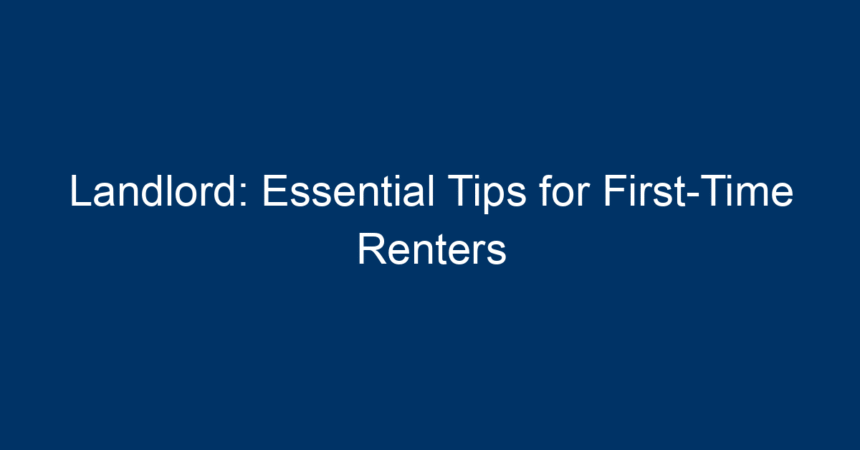Renting your first apartment or house can be an exhilarating yet daunting experience, especially if you’re unfamiliar with the processes involved. As a first-time renter, it’s crucial to navigate the complexities of the rental market and establish a positive relationship with your landlord. This article provides essential tips to help you make informed decisions, ensuring a smoother transition into your new home.
Understanding Your Rights as a Tenant
Before you sign a lease, it’s imperative to understand your rights. Every state has regulations that protect tenants from unfair practices. Familiarize yourself with the following key aspects:
1. Security Deposits
A landlord may require a security deposit, typically equivalent to one month’s rent. This deposit is meant to cover potential damages or unpaid rent. Make sure to ask your landlord about the conditions under which the deposit will be refunded, as laws vary by location.
2. Habitability Laws
Your landlord is obligated to provide a safe and habitable living environment. This includes access to essential services such as heat, electricity, and hot water. If you encounter issues, document them and notify your landlord promptly.
3. Privacy Rights
While your landlord has the right to enter your rental property for maintenance, they typically must provide advance notice. Understanding the legal requirements in your area will help you set boundaries.
Finding the Right Rental Property
Selecting the perfect rental property can significantly impact your living experience. Here are some tips to help you find a great place:
1. Define Your Budget
Before you start your search, establish a budget that includes rent and additional expenses such as utilities, internet, and renters’ insurance. A good rule of thumb is to spend no more than 30% of your monthly income on housing.
2. Research the Neighborhood
Evaluate potential neighborhoods by considering factors like safety, proximity to work or school, public transportation options, and amenities such as grocery stores and parks.
3. Visit Multiple Properties
Don’t settle for the first property you see. Visit multiple listings to compare features, prices, and conditions. This not only gives you a better sense of the market but also allows you to negotiate better terms with your landlord.
The Application Process
Once you’ve found a property that fits your needs, you’ll likely need to go through an application process. Here’s how to prepare:
1. Gather Your Documents
Most landlords will require specific documentation to process your application, including:
- Proof of income (pay stubs or tax returns)
- Employment verification
- Personal references
- Rental history, if applicable
2. Know Your Credit Score
Landlords often run credit checks to assess your financial reliability. Understanding your credit score and addressing any issues before applying can enhance your chances of approval.
3. Be Prepared to Pay Application Fees
Some landlords charge an application fee to cover the cost of background checks. Be ready for this expense when you apply.
Understanding the Lease Agreement
Carefully reviewing the lease agreement is crucial before signing. This document outlines the terms of your rental arrangement, and it’s essential to understand your obligations and rights.
1. Lease Length and Renewal
Most leases are typically for one year, but some may offer month-to-month options. Make sure you know the renewal process and any penalties associated with breaking the lease early.
2. Maintenance Responsibilities
Clarify who is responsible for maintenance and repairs. If your landlord is responsible for certain tasks, make sure the lease delineates these clearly to avoid misunderstandings later.
3. Pet Policies and Other Restrictions
If you have pets, check the policy regarding them. Some landlords may have specific restrictions or additional fees. Ensure that you are comfortable with these terms before signing.
Moving In: Setting Up for Success
Once the paperwork is settled, it’s time to move in! Here are some tips to start your new chapter on the right foot:
1. Conduct a Walk-Through
Before moving your belongings in, conduct a thorough walk-through with the landlord. Document any existing damages, take photographs, and share your findings. This will help prevent any disputes regarding security deposits later on.
2. Set Up Utilities
Contact utility companies before your move-in date to set up essential services like electricity, water, and internet. This ensures that you have everything in place when you arrive.
3. Invest in Renters’ Insurance
Renters’ insurance protects your belongings in the event of theft or damages. It’s usually affordable and can offer peace of mind as you settle into your new home.
Building a Positive Relationship with Your Landlord
Having a good rapport with your landlord can greatly enhance your renting experience. Here’s how to foster a positive relationship:
1. Communicate Openly
Establish clear communication channels with your landlord. Whether it’s discussing maintenance issues or concerns about the property, an open dialogue helps build trust.
2. Pay Rent on Time
Late payments can create unnecessary tension. Set reminders or automate your payments to ensure your rent is always paid on time.
3. Be a Respectful Tenant
Maintain the property and adhere to the lease agreements. This not only ensures that you protect your deposit but also fosters a positive relationship with your landlord.
In Conclusion: Making the Most of Your Renting Experience
Becoming a first-time renter can be a transformative experience filled with challenges and triumphs. By understanding your rights, conducting thorough research, and fostering a healthy relationship with your landlord, you can navigate your new journey with confidence.
Embracing these tips will not only help you become a successful renter but also ease the transition into your new living space. Remember, the goal is to create a home that feels secure, welcoming, and reflective of your personal style. Enjoy the adventure of renting, and don’t hesitate to reach out for help when needed!




